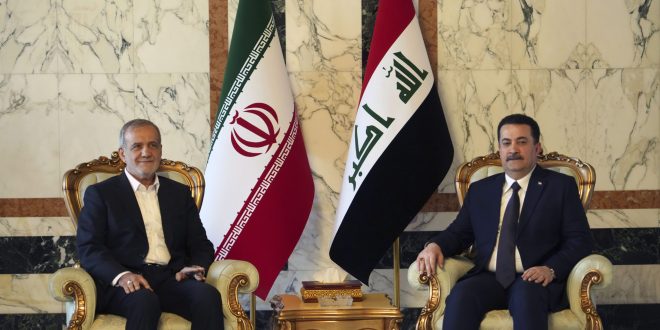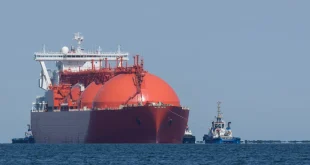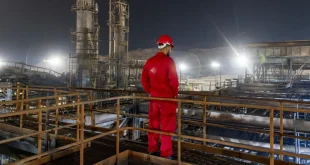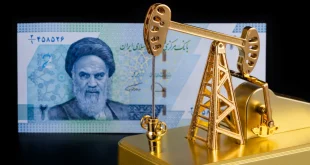In his first trip abroad as president, Masoud Pezeshkian reaffirmed Iraq’s central role in Iran’s foreign policy.
Masoud Pezeshkian’s inaugural trip to Iraq from September 11-13 marked a pivotal moment in the evolving relationship between the two neighbors. The new president’s visit underscores Iraq’s strategic importance to Iran and reflects Pezeshkian’s commitment to strengthening Tehran’s regional partnerships. Iran and Iraq have long had a complex relationship shaped by various religious, economic, and political factors. Pezeshkian’s visit presents an opportunity to advance bilateral cooperation in diplomacy, economic ventures, and security, while addressing challenges posed by regional dynamics and the international sanctions against Iran. Pezeshkian’s approach to Iraq will likely shift the trajectory of the two countries’ relations in several significant ways.
Pezeshkian’s choice to make Iraq his first official international visit highlights Iraq’s centrality to Iran’s foreign policy and regional strategy. Since the fall of Saddam Hussein in 2003, Iraq has acted as a crucial political and economic partner for Tehran—a relative constant amid the region’s complex and shifting dynamics. Pezeshkian’s visit takes place at a critical juncture, as the Middle East faces its most significant conflict in decades and the potential for even greater escalation. Given the two states’ shared border and deep religious, cultural, and economic ties, Iran’s stability is closely linked to that of its neighbor. Pezeshkian’s prioritization of Iraq signals his administration’s dedication to strengthening relations with Baghdad and addressing mutual challenges amid regional volatility.
During his visit to Baghdad, Pezeshkian described Iraq as a “friend and brother country” and emphasized the importance of implementing security cooperation agreements between Iran and Iraq. At a joint press conference with Iraqi Prime Minister Mohammed Shia al-Sudani, he stressed the need for these agreements to counter terrorists and enemies who threaten regional stability and security. Pezeshkian reiterated that these measures are vital to maintaining peace and addressing those who have previously targeted the region’s security.
The Importance of Iraq
The purpose of Pezeshkian’s visit was to demonstrate the new Iranian government’s emphasis on regional diplomacy with Iraq as its focal point, as well as further cementing the close ties between the two nations. This outreach is a part of Iran’s larger plan to strengthen regional relationships, foster better relations with its neighbors, and support a more stable Middle East—all with the overarching goal of improving the Islamic Republic’s economic outlook. Of course, Iran’s main goal in regional policy is to increase its power by assisting partner governments and proxy groups around the Middle East as part of its “Axis of Resistance” strategy. So in addition to fostering relations with the official Iraqi government is important, so to is keeping up relations with Shia forces in Iraq. The intricate geopolitical calculations are reflected in this twin policy of diplomacy and proxy warfare, which strikes a balance between its aim for regional hegemony and its need for economic respite from sanctions.
Iran can strengthen its influence and aid in the development of Iraq by increasing its commercial interests in the strategically important region of Basra, which lacks an effective energy grid and sufficient transportation infrastructure. Historically, Iran has not supported development but instead prioritized retaining power through political and militant proxies. For example, unrest has been exacerbated by Iran’s decision to stop exporting electricity to Basra.Iran’s engagement in Iraq frequently puts its own geopolitical objectives ahead of Iraq’s developmental requirements. Iran’s actions have often proved destabilizing, despite some economic cooperation, with bilateral trade anticipated to surpass $20 billion by 2027. While it appears exceedingly unlikely that Iran will support major infrastructure projects in Iraq, it is still a means by which in a way Iran could strengthen ties.
Iran’s key geopolitical objectives in relation to Iraq and infrastructure development involve solidifying and expanding its influence in Iraq as a strategic ally and buffer against potential threats from the U.S. and regional competitors. Iran aims to establish a land corridor through Iraq to Syria and Lebanon, bolstering its “Axis of Resistance,” and to counter the effects of sanctions by utilizing Iraq as an economic lifeline, with bilateral trade anticipated to reach $20 billion. Additionally, Iran seeks to block alternative trade routes, like the Iraq-Turkey-Europe “Development Road,” which could diminish Iraq’s reliance on Iran. It also strives to position itself as a regional transit hub by linking its rail systems through Iraq to the Mediterranean. Through investments in joint infrastructure projects, including a $3 billion credit line for reconstruction and plans to connect rail networks, Iran hopes to increase its economic influence. These objectives highlight Iran’s broader strategy for regional dominance and economic resilience while further aligning Iraq with its interests.
President Pezeshkian’s subsequent visit to Kurdistan provides a major opportunity for Iran to strengthen ties with the Kurdistan Regional Government (KRG), as well. During his engagements with Kurdish officials, the new president discussed urgent border and security issues. Such issues include cross-border militancy from ISIS remnants, illicit smuggling and arms trafficking, and tensions over disputed territory like Kirkuk with Kurdish leaders. Managing Iranian-backed militias close to Kurdish borders and resolving security issues with refugee flows from nearby conflict zones, such as Syria, are additional concerns. Developing coordinated responses addressing these difficulties requires active engagement with Kurdish authorities in Sulaymaniyah and Erbil.
Direct communication with said Kurdish authorities can improve diplomatic ties and result in cooperative solutions for problems pertaining to regional security. Furthermore, the visit will promote more fruitful connections between Iran and the Kurdistan area and contribute to the stability and growth of the area by facilitating cultural and economic exchanges.
Iran, Turkey, and Iraq could cooperate with Kurdish authorities in several important areas, including coordinated measures to counter PKK activity, cooperative border security to prevent smuggling, and cooperation on refugee and humanitarian issues. Stability and regional links might be further enhanced by economic cooperation, such as the extension of the Shalamche-Basra railway to Kurdish districts and discussions on water resource management to solve issues like droughts and agricultural concerns.
The two sides signed a memoranda of understanding on security cooperation—put on hold since the unexpected death of former Iranian President Ebrahim Raisi—aimed at strengthening border security, counterterrorism efforts, and information sharing. In the face of escalating tensions, these agreements will enhance the strategic partnership between Iran and Iraq in tackling common security issues.
A Comprehensive Relationship
Pezeshkian’s choice to visit Iraq underlines just how critical its neighbor is to Iranian foreign policy. Indeed, the two states share a unique dynamic and relationship that spans the breadth of issues.
Iraq’s centrality to regional geopolitics made it a natural first destination for the new president. Iran‘s involvement in Iraq is driven by deeper strategic motivations. It views Iraq as a critical buffer against threats like ISIS and seeks to maintain influence to prevent the rise of a strong, independent Iraqi state that could challenge Iran. These interests, shaped by the Iran-Iraq War and Iran’s regional ambitions, are more significant than Iraq’s recent mediation efforts.
Obstacles to Cooperation
Under President Masoud Pezeshkian, relations between Iran and Iraq may appear promising, but they also face a number of major obstacles. Security is of the utmost importance in both nations because of the ongoing risks posed by sabotage organizations, such as ISIS and Al Qaeda affiliates, and the need to secure their shared border. Important initiatives in this respect include putting the March 2023 security agreement into effect and addressing the actions of Iraqi organizations that may pose a threat to Iranian interests.
The Supreme National Security Council and IRGC of Iran, as well as the federal government, National Security Council, and Kurdistan Regional Government (KRG) of Iraq, are major players in the security pact that was signed in March 2023 between the two countries. Relocating Iranian Kurdish opposition groups from the border, disarming anti-Iranian organizations, exchanging intelligence, cooperating border patrols, and perhaps extraditing those Iran wants are some of the steps taken to address threats to Iranian interests. In order to allay Iran’s worries about Kurdish separatist movements operating out of Iraqi territory, the KRG may also impose political restrictions on these organizations.
These security concerns are exacerbated by Iran’s well-established backing of numerous extremist organizations in Iraq. Iran’s actions frequently run counter to its diplomatic rhetoric supporting regional security, as evidenced by its lengthy history of supplying and funding organizations like Asaib Ahl al-Haq and Kataib Hezbollah in Iraq, both of which the US has blacklisted as terrorist groups.
Iraq is struggling to maintain political autonomy and sovereignty, in addition to these security-related issues. Baghdad must strike a balance between support and challenges provided by the United States and Iran. The US, who retains a significant military presence in Iraq, is crucial in Iraq’s effort to fight ISIS. The US military presence, however, is a reminder of Iraq’s dependence on their former occupier. Similarly where Iran provides some security assistance, there are also some Iran-backed armed groups have challenged the sovereignty of the Iraqi state.
Iraq also faces a major financial crunch that will take some ingenuity to escape. Iraq has long sourced its foreign energy from Iran, which mainly supplies natural gas for electricity generation. However, Iraq’s debts to its eastern neighbor have reached $11 billion, a situation complicated by U.S. sanctions that have limited Iraq’s ability to make direct payments to Tehran. A new arrangement has been set up where Iraqi refined products are exchanged for Iranian gas, with the proceeds used to reduce the debt. This deal may raise U.S. concerns, as it could provide Iran with easier access to cash. Looking forward, Iraq is working to diversify its energy sources, including plans to join a Gulf Cooperation Council electricity network and explore gas imports from Qatar, which could lessen its dependence on Iranian energy.
Notwithstanding these challenges, there exist significant prospects to enhance cooperation. Developing stronger political, cultural, and economic ties will improve stability and benefit both countries.
Pezeshkian’s visit fits neatly within Iran’s larger plan to fortify its historical, religious, and cultural ties to Iraq to maintain its influence over all facets of the two countries’ relationship. The government of President Masoud Pezeshkian has a mandate to improve cooperation between Iran and Iraq despite the complexity of their relationship. Indeed, rather than simply dominate its neighbor, however, Iran should seize the opportunity to advance solutions in areas of mutual concern, including security, political autonomy, and regional influence. The struggle will be upholding the sovereignty of both countries throughout this process by engaging in vigorous negotiation and diplomacy. Prioritizing common goals such as establishing revenue-sharing policies and navigating water precarity and infrastructure planning will be essential. Working towards achieving these goals will certainly strengthen relations, but navigating the region’s complicated political terrain will require deft maneuvering from administrations already under significant domestic pressure to deliver results for ordinary citizens.





